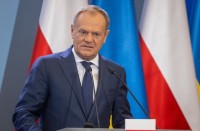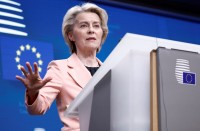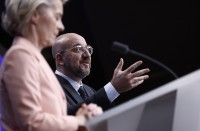EU Parliament President Martin Schulz lent his support to Colombia’s peace process on Tuesday (August 23) even as he cited a concern over democracy in neighbouring Venezuela.
On a visit to Bogota where he met with Colombian President Juan Manuel Santos, Schulz praised the agreement between Bogota and the leftist Revolutionary Armed Forces of Colombia (FARC).
“We expect this will be a decisive, sustainable and lasting peace process. We believe it will be a good agreement for the country and the region and that it could also serve as an example and model for many other conflicts that are currently taking place in the world. Because of this, we cross our fingers for everything to turn out well,” he said.
In late June, Colombia’s government and leftist FARC rebels signed a historic ceasefire deal that brought them tantalizingly close to ending the longest running conflict in the Americas.
The accord, capping three years of peace talks in Cuba, sparked celebrations and tears of happiness among some in the Colombian capital. It sets the stage for a final deal to end a guerrilla war born in the 1960s out of frustration with deep socio-economic inequalities that outlived all other major uprisings in Latin America.
Once a final deal is ready, it will be put to the Colombian people in a plebiscite, a promise made by Santos that had been a key sticking point.
Schulz said he is confident that the plebiscite will pass.
“The European Parliament, like the member states of the European Union, have followed this peace process closely for the past few years. We in the EU Parliament have supported this process. We believe that we must accompany this political and financial process and we are also willing to give this process our political and economic help. The negotiations that are taking place in Havana will make it possible for this process to reach a successful conclusion and be a success in the future. We expect the same thing to happen with the plebiscite,” he added.
However, the EU Parliament leader was not as optimistic at events taking place in neighbouring Venezuela, where a deep economic and political crisis threaten stability.
The drop in oil prices and rampant mismanagement have triggered a deep recession in the OPEC nation and opposition lawmakers are calling for a recall referendum against the unpopular president, Nicolas Maduro.
With opposition leaders imprisoned, Maduro has called for public workers who backed a referendum to be dismissed even as critical shortages of food and medicine long queues, looting and daily food riots.
Schulz said he was deeply concerned.
“We believe democracy is in danger in Venezuela,” he said, adding that talks between the opposition and ruling party are the key to finding a peaceful solution in Venezuela.
“It is important for both parties to keep open all possible paths that could lead to a national dialogue,” he added.
Polls indicate that Maduro is likely to lose a new election.
The opposition accuses the electoral council of stalling the process for a referendum so that it takes place next year.
The timing is important because if Maduro loses a referendum this year, the elections council would call a new election – which polls indicate he would likely lose. Losing a referendum after January would mean he would be replaced by his vice president, effectively leaving the Socialist Party in power.
(c) Copyright Thomson Reuters 2016







